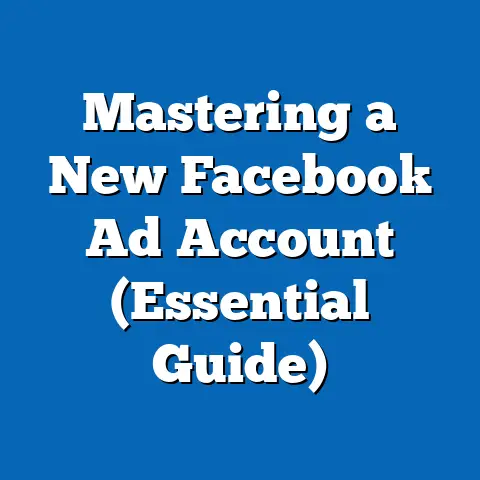Overcome Facebook Ad Account Restrictions (Expert Tactics)
Navigating the ever-evolving landscape of Facebook advertising can feel like walking a tightrope, especially when you factor in the possibility of ad account restrictions.
It’s a reality that many of us face, and believe me, I’ve been there.
I remember when one of my first clients, a local bakery, had their account suspended right before a major holiday promotion.
The panic was real!
That experience taught me the absolute necessity of understanding and adhering to Facebook’s advertising policies.
According to recent data, over 30% of advertisers experience some form of account restriction on Facebook.
That’s a significant number, representing lost revenue and wasted marketing budgets for countless businesses.
These restrictions can range from temporary ad disapprovals to full-blown account suspensions, each impacting your ability to reach your target audience and achieve your marketing goals.
Understanding Facebook’s Ad Policies
Facebook’s advertising policies and community standards are the bedrock of its platform, designed to ensure a safe and positive experience for its users.
These guidelines cover a wide range of topics, from prohibited content and discriminatory practices to misleading or deceptive claims.
As advertisers, it is crucial that we understand and adhere to these policies to avoid running afoul of Facebook’s rules.
Common Reasons for Account Restrictions
Ad accounts can be restricted for a variety of reasons, often stemming from violations of Facebook’s advertising policies.
Here are some of the most common culprits:
Policy Violations: This is the most straightforward reason.
It includes anything from promoting prohibited content (like illegal products or services) to making unsubstantiated claims in your ads.Suspicious Activity: Facebook’s algorithms are constantly scanning for unusual or suspicious behavior that could indicate fraudulent activity or policy violations.
This can include sudden spikes in ad spend, unusual targeting patterns, or multiple login attempts from different locations.-
Recurrent Negative Feedback: If your ads consistently receive negative feedback from users (e.g., people hiding your ads, reporting them as spam, or leaving negative comments), Facebook may restrict your account to protect its users from a poor advertising experience.
-
Circumventing Systems: Attempting to bypass Facebook’s review processes or using deceptive tactics to get ads approved can lead to severe penalties, including permanent account suspension.
-
Poor Account History: A history of policy violations or negative feedback can make your account more susceptible to restrictions, even if your current ads are compliant.
Policy Violations: This is the most straightforward reason.
It includes anything from promoting prohibited content (like illegal products or services) to making unsubstantiated claims in your ads.
Suspicious Activity: Facebook’s algorithms are constantly scanning for unusual or suspicious behavior that could indicate fraudulent activity or policy violations.
This can include sudden spikes in ad spend, unusual targeting patterns, or multiple login attempts from different locations.
Recurrent Negative Feedback: If your ads consistently receive negative feedback from users (e.g., people hiding your ads, reporting them as spam, or leaving negative comments), Facebook may restrict your account to protect its users from a poor advertising experience.
Circumventing Systems: Attempting to bypass Facebook’s review processes or using deceptive tactics to get ads approved can lead to severe penalties, including permanent account suspension.
Poor Account History: A history of policy violations or negative feedback can make your account more susceptible to restrictions, even if your current ads are compliant.
I remember once working with a client who kept getting their ads disapproved because they were promoting weight loss products with before-and-after photos.
While their intentions were good, these types of images are often flagged as violating Facebook’s policies against promoting unrealistic expectations.
We had to completely revamp their ad creative to comply with the guidelines.
Staying Updated on Policy Changes
Facebook’s advertising policies are not set in stone.
They are constantly evolving to address new challenges and reflect changes in user behavior.
It’s essential to stay informed about these changes to ensure your ads remain compliant.
-
Regularly Review Facebook’s Advertising Policies: Make it a habit to periodically review the official Facebook Advertising Policies and Community Standards.
-
Subscribe to Facebook’s Business News and Updates: Stay informed about policy changes and new features by subscribing to Facebook’s official business news and updates.
-
Participate in Industry Forums and Communities: Engage with other advertisers in industry forums and communities to share insights and stay up-to-date on the latest policy changes and best practices.
Regularly Review Facebook’s Advertising Policies: Make it a habit to periodically review the official Facebook Advertising Policies and Community Standards.
Subscribe to Facebook’s Business News and Updates: Stay informed about policy changes and new features by subscribing to Facebook’s official business news and updates.
Participate in Industry Forums and Communities: Engage with other advertisers in industry forums and communities to share insights and stay up-to-date on the latest policy changes and best practices.
Key Takeaway: Understanding Facebook’s ad policies is the foundation for a successful and compliant advertising strategy.
Regularly review the policies, stay informed about changes, and ensure your ads adhere to the guidelines to minimize the risk of account restrictions.
Strategies to Prevent Account Restrictions
Prevention is always better than cure.
Taking proactive steps to minimize the risk of account restrictions can save you time, money, and a whole lot of stress.
Here are some strategies I’ve found particularly effective:
Maintaining a Clean Ad History
A clean ad history is like a good credit score for your Facebook ad account.
It demonstrates to Facebook that you are a responsible advertiser who adheres to its policies.
Here’s how to build and maintain a clean ad history:
Adhere to Facebook’s Policies: This should go without saying, but it’s worth repeating.
Ensure all your ads comply with Facebook’s advertising policies and community standards.-
Avoid Risky or Controversial Content: Steer clear of topics that are likely to generate negative feedback or policy violations.
Monitor Ad Performance and Feedback: Regularly monitor the performance of your ads and pay attention to user feedback.
Address any negative comments or reports promptly.-
Avoid Sudden Changes in Ad Spend or Targeting: Drastic changes in ad spend or targeting can trigger Facebook’s algorithms and raise red flags.
Adhere to Facebook’s Policies: This should go without saying, but it’s worth repeating.
Ensure all your ads comply with Facebook’s advertising policies and community standards.
Avoid Risky or Controversial Content: Steer clear of topics that are likely to generate negative feedback or policy violations.
Monitor Ad Performance and Feedback: Regularly monitor the performance of your ads and pay attention to user feedback.
Address any negative comments or reports promptly.
Avoid Sudden Changes in Ad Spend or Targeting: Drastic changes in ad spend or targeting can trigger Facebook’s algorithms and raise red flags.
Creating Compliant Ad Content
Creating compliant ad content is essential for avoiding policy violations and account restrictions.
Here are some tips to help you create ads that meet Facebook’s guidelines:
-
Be Clear and Transparent: Ensure your ad copy and landing pages are clear, transparent, and accurately represent your product or service.
-
Avoid Misleading or Deceptive Claims: Don’t make claims that are unsubstantiated or likely to mislead users.
-
Use Appropriate Targeting: Ensure your targeting practices comply with Facebook’s policies on discrimination and privacy.
Adhere to Image and Video Guidelines: Use high-quality images and videos that are relevant to your ad copy and landing pages.
Avoid using sexually suggestive or violent content.-
Respect User Privacy: Don’t collect or use personal information without obtaining proper consent.
Be Clear and Transparent: Ensure your ad copy and landing pages are clear, transparent, and accurately represent your product or service.
Avoid Misleading or Deceptive Claims: Don’t make claims that are unsubstantiated or likely to mislead users.
Use Appropriate Targeting: Ensure your targeting practices comply with Facebook’s policies on discrimination and privacy.
Adhere to Image and Video Guidelines: Use high-quality images and videos that are relevant to your ad copy and landing pages.
Avoid using sexually suggestive or violent content.
Respect User Privacy: Don’t collect or use personal information without obtaining proper consent.
I once worked with a health supplement company that kept getting their ads disapproved because they were using overly aggressive language and making exaggerated claims about the benefits of their products.
We had to work with them to tone down their messaging and focus on providing accurate and realistic information.
Best Practices for Account Management
Effective account management is crucial for maintaining a healthy and compliant Facebook ad account.
Here are some best practices to follow:
-
Regularly Review Ad Performance: Keep a close eye on the performance of your ads and identify any potential issues or areas for improvement.
-
Monitor User Feedback: Pay attention to user feedback and address any negative comments or reports promptly.
-
Stay Updated on Policy Changes: As mentioned earlier, it’s essential to stay informed about changes to Facebook’s advertising policies.
Use Facebook Business Manager: Facebook Business Manager provides a centralized platform for managing your ad accounts, pages, and other assets.
It also offers advanced features for managing user permissions and security.-
Enable Two-Factor Authentication: Protect your account from unauthorized access by enabling two-factor authentication.
Regularly Review Ad Performance: Keep a close eye on the performance of your ads and identify any potential issues or areas for improvement.
Monitor User Feedback: Pay attention to user feedback and address any negative comments or reports promptly.
Stay Updated on Policy Changes: As mentioned earlier, it’s essential to stay informed about changes to Facebook’s advertising policies.
Use Facebook Business Manager: Facebook Business Manager provides a centralized platform for managing your ad accounts, pages, and other assets.
It also offers advanced features for managing user permissions and security.
Enable Two-Factor Authentication: Protect your account from unauthorized access by enabling two-factor authentication.
Key Takeaway: Proactive prevention is key to avoiding Facebook ad account restrictions.
Maintain a clean ad history, create compliant ad content, and follow best practices for account management to minimize your risk of running afoul of Facebook’s policies.
Steps to Take When Facing Restrictions
Despite our best efforts, ad account restrictions can still happen.
If you find yourself in this situation, it’s important to act quickly and strategically.
Here are the steps you should take:
Accessing the Account Quality Dashboard
The Account Quality dashboard is your go-to resource for understanding the status of your ad account and identifying any potential issues.
Here’s how to access it:
-
Go to Facebook Business Manager: Log in to your Facebook Business Manager account.
-
Navigate to Account Quality: In the left-hand menu, click on “Account Quality.”
-
Review Your Account Status: The Account Quality dashboard provides an overview of your account’s status, including any restrictions or policy violations.
Go to Facebook Business Manager: Log in to your Facebook Business Manager account.
Navigate to Account Quality: In the left-hand menu, click on “Account Quality.”
Review Your Account Status: The Account Quality dashboard provides an overview of your account’s status, including any restrictions or policy violations.
Appealing a Restriction
If you believe your account has been restricted in error, you have the right to appeal the decision.
Here’s how to do it:
-
Review the Reason for the Restriction: Carefully review the reason for the restriction provided in the Account Quality dashboard.
Gather Supporting Evidence: Collect any evidence that supports your claim that the restriction was unwarranted.
This could include documentation of your compliance efforts, testimonials from satisfied customers, or screenshots of your ad creative.Write a Compelling Appeal Letter: Craft a clear, concise, and professional appeal letter that explains why you believe the restriction was unjustified.
Be polite and respectful, and avoid making accusatory statements.-
Submit Your Appeal: Submit your appeal through the Account Quality dashboard.
Review the Reason for the Restriction: Carefully review the reason for the restriction provided in the Account Quality dashboard.
Gather Supporting Evidence: Collect any evidence that supports your claim that the restriction was unwarranted.
This could include documentation of your compliance efforts, testimonials from satisfied customers, or screenshots of your ad creative.
Write a Compelling Appeal Letter: Craft a clear, concise, and professional appeal letter that explains why you believe the restriction was unjustified.
Be polite and respectful, and avoid making accusatory statements.
Submit Your Appeal: Submit your appeal through the Account Quality dashboard.
I once had a client whose account was restricted because Facebook’s algorithms mistakenly flagged their ads as promoting counterfeit goods.
We gathered documentation proving the authenticity of their products and wrote a detailed appeal letter explaining the situation.
After a few days, Facebook reviewed our appeal and lifted the restriction.
Being Patient and Responsive
The review process can take time, so it’s important to be patient.
However, it’s also important to be responsive to any requests for information or clarification from Facebook.
-
Monitor Your Email: Keep a close eye on your email inbox for any communication from Facebook.
-
Respond Promptly: Respond to any requests for information or clarification as quickly as possible.
-
Be Polite and Professional: Maintain a polite and professional tone in all your communication with Facebook.
Monitor Your Email: Keep a close eye on your email inbox for any communication from Facebook.
Respond Promptly: Respond to any requests for information or clarification as quickly as possible.
Be Polite and Professional: Maintain a polite and professional tone in all your communication with Facebook.
Key Takeaway: If your ad account is restricted, access the Account Quality dashboard, review the reason for the restriction, and appeal the decision if you believe it was unjustified.
Be patient, responsive, and maintain a polite and professional tone throughout the process.
Utilizing Expert Tactics to Navigate Restrictions
Beyond the standard procedures, seasoned marketers often employ advanced strategies to navigate Facebook ad account restrictions.
These tactics can help you minimize the impact of restrictions and get your account back on track.
Diversifying Ad Accounts
Putting all your eggs in one basket is never a good idea, especially when it comes to Facebook ad accounts.
Diversifying your ad accounts can help you mitigate the risk of a single restriction crippling your entire advertising operation.
-
Create Multiple Ad Accounts: Create multiple ad accounts under your Business Manager account.
-
Distribute Your Ad Spend: Distribute your ad spend across multiple accounts to avoid relying too heavily on any single account.
-
Use Different Payment Methods: Using different payment methods for each account can help prevent restrictions related to payment issues.
Create Multiple Ad Accounts: Create multiple ad accounts under your Business Manager account.
Distribute Your Ad Spend: Distribute your ad spend across multiple accounts to avoid relying too heavily on any single account.
Use Different Payment Methods: Using different payment methods for each account can help prevent restrictions related to payment issues.
Leveraging Facebook Support and Community Forums
Facebook offers a variety of support resources to help advertisers resolve issues and navigate restrictions.
Contact Facebook Support: Reach out to Facebook Support for assistance with your account restriction.
Be prepared to provide detailed information about your account and the reason for the restriction.-
Engage in Community Forums: Participate in Facebook’s community forums to connect with other advertisers, share insights, and seek advice.
Contact Facebook Support: Reach out to Facebook Support for assistance with your account restriction.
Be prepared to provide detailed information about your account and the reason for the restriction.
Engage in Community Forums: Participate in Facebook’s community forums to connect with other advertisers, share insights, and seek advice.
Testing Ad Variations
Testing ad variations can help you identify which elements of your ads are triggering restrictions.
-
Create Multiple Ad Variations: Create multiple variations of your ads with slight differences in ad copy, images, and targeting.
-
Monitor Performance: Monitor the performance of each ad variation and identify which ones are getting restricted.
-
Adjust Your Ads: Adjust your ads based on the performance data to avoid triggering restrictions.
Create Multiple Ad Variations: Create multiple variations of your ads with slight differences in ad copy, images, and targeting.
Monitor Performance: Monitor the performance of each ad variation and identify which ones are getting restricted.
Adjust Your Ads: Adjust your ads based on the performance data to avoid triggering restrictions.
Key Takeaway: Diversifying ad accounts, leveraging Facebook support and community forums, and testing ad variations are expert tactics that can help you navigate Facebook ad account restrictions more effectively.
Long-Term Solutions and Best Practices
Overcoming Facebook ad account restrictions is not just about dealing with immediate issues; it’s about implementing long-term solutions and best practices to prevent future problems.
Establishing a Compliance Checklist
A compliance checklist can help you ensure that all your ads meet Facebook’s guidelines before they are published.
-
Review Facebook’s Advertising Policies: Regularly review Facebook’s advertising policies and community standards.
-
Check Ad Copy for Prohibited Content: Ensure your ad copy does not contain any prohibited content, such as hate speech, violence, or illegal products.
-
Verify Targeting Practices: Verify that your targeting practices comply with Facebook’s policies on discrimination and privacy.
-
Ensure Landing Pages are Compliant: Ensure that your landing pages are clear, transparent, and accurately represent your product or service.
-
Monitor User Feedback: Monitor user feedback and address any negative comments or reports promptly.
Review Facebook’s Advertising Policies: Regularly review Facebook’s advertising policies and community standards.
Check Ad Copy for Prohibited Content: Ensure your ad copy does not contain any prohibited content, such as hate speech, violence, or illegal products.
Verify Targeting Practices: Verify that your targeting practices comply with Facebook’s policies on discrimination and privacy.
Ensure Landing Pages are Compliant: Ensure that your landing pages are clear, transparent, and accurately represent your product or service.
Monitor User Feedback: Monitor user feedback and address any negative comments or reports promptly.
Continuous Education and Adaptation
Facebook’s advertising landscape is constantly evolving, so it’s important to stay informed about the latest changes and best practices.
-
Attend Industry Conferences and Webinars: Attend industry conferences and webinars to learn from experts and stay up-to-date on the latest trends.
-
Read Industry Blogs and Publications: Follow industry blogs and publications to stay informed about changes to Facebook’s advertising policies and best practices.
-
Experiment with New Features: Experiment with new features and ad formats to see what works best for your business.
Attend Industry Conferences and Webinars: Attend industry conferences and webinars to learn from experts and stay up-to-date on the latest trends.
Read Industry Blogs and Publications: Follow industry blogs and publications to stay informed about changes to Facebook’s advertising policies and best practices.
Experiment with New Features: Experiment with new features and ad formats to see what works best for your business.
Building a Reputable Brand Presence
A reputable brand presence can help lessen the chances of account restrictions.
-
Create a Professional Facebook Page: Create a professional Facebook page that accurately represents your brand and provides valuable information to your audience.
-
Engage with Your Audience: Engage with your audience by responding to comments and messages, and by creating valuable content that they will appreciate.
-
Build a Positive Reputation: Build a positive reputation by providing excellent customer service and resolving any issues promptly.
Create a Professional Facebook Page: Create a professional Facebook page that accurately represents your brand and provides valuable information to your audience.
Engage with Your Audience: Engage with your audience by responding to comments and messages, and by creating valuable content that they will appreciate.
Build a Positive Reputation: Build a positive reputation by providing excellent customer service and resolving any issues promptly.
I’ve seen firsthand how a strong brand reputation can make a difference.
One of my clients, a local bookstore, had built a loyal following on Facebook through engaging content and excellent customer service.
When they accidentally violated a minor policy, Facebook was much more lenient with them because of their positive reputation.
Key Takeaway: Long-term success in managing Facebook ad accounts requires establishing a compliance checklist, continuous education and adaptation, and building a reputable brand presence.
In conclusion, overcoming Facebook ad account restrictions is an ongoing process that requires a combination of understanding Facebook’s ad policies, proactive measures, and utilizing expert tactics.
By following the strategies outlined in this article, you can safeguard your ad accounts against restrictions and achieve sustained advertising success on Facebook.
Remember, the key is to stay informed, be proactive, and maintain a positive and compliant presence on the platform.
Now, I’d love to hear from you.
What experiences have you had with Facebook ad restrictions?
Share your stories and tips in the comments below.
And if you found this article helpful, be sure to follow for more expert insights and tips on maximizing your digital marketing efforts.






